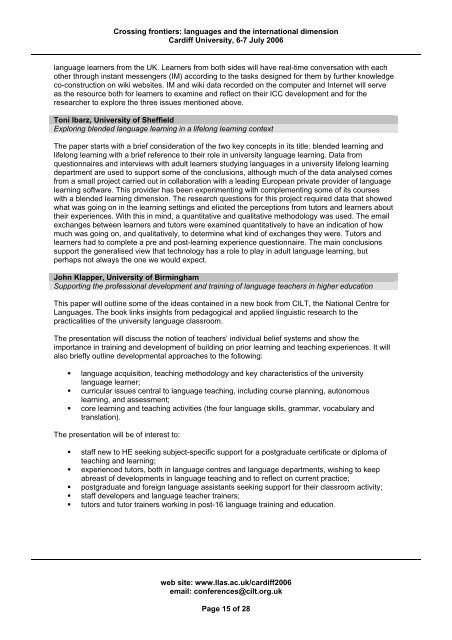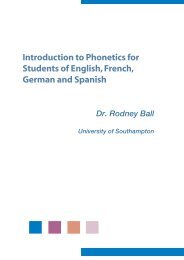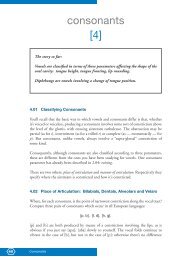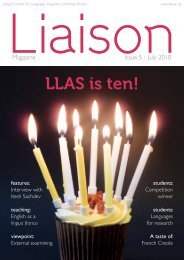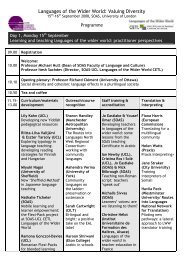Crossing frontiers: Languages and the international dimension
Crossing frontiers: Languages and the international dimension
Crossing frontiers: Languages and the international dimension
You also want an ePaper? Increase the reach of your titles
YUMPU automatically turns print PDFs into web optimized ePapers that Google loves.
<strong>Crossing</strong> <strong>frontiers</strong>: languages <strong>and</strong> <strong>the</strong> <strong>international</strong> <strong>dimension</strong><br />
Cardiff University, 6-7 July 2006<br />
language learners from <strong>the</strong> UK. Learners from both sides will have real-time conversation with each<br />
o<strong>the</strong>r through instant messengers (IM) according to <strong>the</strong> tasks designed for <strong>the</strong>m by fur<strong>the</strong>r knowledge<br />
co-construction on wiki websites. IM <strong>and</strong> wiki data recorded on <strong>the</strong> computer <strong>and</strong> Internet will serve<br />
as <strong>the</strong> resource both for learners to examine <strong>and</strong> reflect on <strong>the</strong>ir ICC development <strong>and</strong> for <strong>the</strong><br />
researcher to explore <strong>the</strong> three issues mentioned above.<br />
Toni Ibarz, University of Sheffield<br />
Exploring blended language learning in a lifelong learning context<br />
The paper starts with a brief consideration of <strong>the</strong> two key concepts in its title: blended learning <strong>and</strong><br />
lifelong learning with a brief reference to <strong>the</strong>ir role in university language learning. Data from<br />
questionnaires <strong>and</strong> interviews with adult learners studying languages in a university lifelong learning<br />
department are used to support some of <strong>the</strong> conclusions, although much of <strong>the</strong> data analysed comes<br />
from a small project carried out in collaboration with a leading European private provider of language<br />
learning software. This provider has been experimenting with complementing some of its courses<br />
with a blended learning <strong>dimension</strong>. The research questions for this project required data that showed<br />
what was going on in <strong>the</strong> learning settings <strong>and</strong> elicited <strong>the</strong> perceptions from tutors <strong>and</strong> learners about<br />
<strong>the</strong>ir experiences. With this in mind, a quantitative <strong>and</strong> qualitative methodology was used. The email<br />
exchanges between learners <strong>and</strong> tutors were examined quantitatively to have an indication of how<br />
much was going on, <strong>and</strong> qualitatively, to determine what kind of exchanges <strong>the</strong>y were. Tutors <strong>and</strong><br />
learners had to complete a pre <strong>and</strong> post-learning experience questionnaire. The main conclusions<br />
support <strong>the</strong> generalised view that technology has a role to play in adult language learning, but<br />
perhaps not always <strong>the</strong> one we would expect.<br />
John Klapper, University of Birmingham<br />
Supporting <strong>the</strong> professional development <strong>and</strong> training of language teachers in higher education<br />
This paper will outline some of <strong>the</strong> ideas contained in a new book from CILT, <strong>the</strong> National Centre for<br />
<strong>Languages</strong>. The book links insights from pedagogical <strong>and</strong> applied linguistic research to <strong>the</strong><br />
practicalities of <strong>the</strong> university language classroom.<br />
The presentation will discuss <strong>the</strong> notion of teachers’ individual belief systems <strong>and</strong> show <strong>the</strong><br />
importance in training <strong>and</strong> development of building on prior learning <strong>and</strong> teaching experiences. It will<br />
also briefly outline developmental approaches to <strong>the</strong> following:<br />
� language acquisition, teaching methodology <strong>and</strong> key characteristics of <strong>the</strong> university<br />
language learner;<br />
� curricular issues central to language teaching, including course planning, autonomous<br />
learning, <strong>and</strong> assessment;<br />
� core learning <strong>and</strong> teaching activities (<strong>the</strong> four language skills, grammar, vocabulary <strong>and</strong><br />
translation).<br />
The presentation will be of interest to:<br />
� staff new to HE seeking subject-specific support for a postgraduate certificate or diploma of<br />
teaching <strong>and</strong> learning;<br />
� experienced tutors, both in language centres <strong>and</strong> language departments, wishing to keep<br />
abreast of developments in language teaching <strong>and</strong> to reflect on current practice;<br />
� postgraduate <strong>and</strong> foreign language assistants seeking support for <strong>the</strong>ir classroom activity;<br />
� staff developers <strong>and</strong> language teacher trainers;<br />
� tutors <strong>and</strong> tutor trainers working in post-16 language training <strong>and</strong> education.<br />
web site: www.llas.ac.uk/cardiff2006<br />
email: conferences@cilt.org.uk<br />
Page 15 of 28


